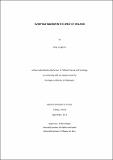| dc.description.abstract | Everyday life might be described as a rhythmic flow of routines and practices that frame social life’s multitudinous interactional episodes. Everyday social life is also punctuated by various types of racism that can be mapped along a continuum, from racist physical and verbal abuse to more subtle practices and discourses of racialized exclusion. Combining qualitative interviews with (auto-) ethnography, this thesis explores everyday racism in the City of Galway in the West of Ireland. The last census (2011) recorded 19.4 percent of the city’s resident population as ‘non-Irish nationals’, making it the most ‘multi-cultural’ city in the Republic of Ireland. As this thesis demonstrates, everyday racism is very much a feature of multi-cultural Ireland, evidenced for example when the rhythm of everyday praxis, such as walking a dog on a local beach is ruptured by a violent racist assault, as was the case with one of my informants. At the other end of the continuum are banal racist episodes which generally exist beneath the radar of reported (and reportable) actions and experiences.
The everyday is theorized using six core concepts: the social, social space, practices, scripts, flow and temporality, drawing on the work of Bourdieu (1977, 1989 and 1990), Giddens (1984) and Pink (2012). The methodological journey describes how reflexivity was key to addressing incumbent methodological and ethical challenges facing a white female researcher interviewing and volunteering with people from various multi-ethnic backgrounds. The research findings are divided into three parts: episodes of overt racism, including physical assault and verbal abuse; everyday racism, comprising discourses and practices of exclusion which occur in fields of social life including education, work and leisure; and everyday racist discourse which occurs without the presence of the Other and yet remains an intrinsic part of the process that constitutes racialized difference. These three areas describe how overt racism disrupts yet also shapes the lives of those impacted, while more banal episodes become part of everyday life and practices, with both underpinned by racist discourses which circulate and change over time, configuring and re-constituting us/them relations in Irish society. | en_IE |


